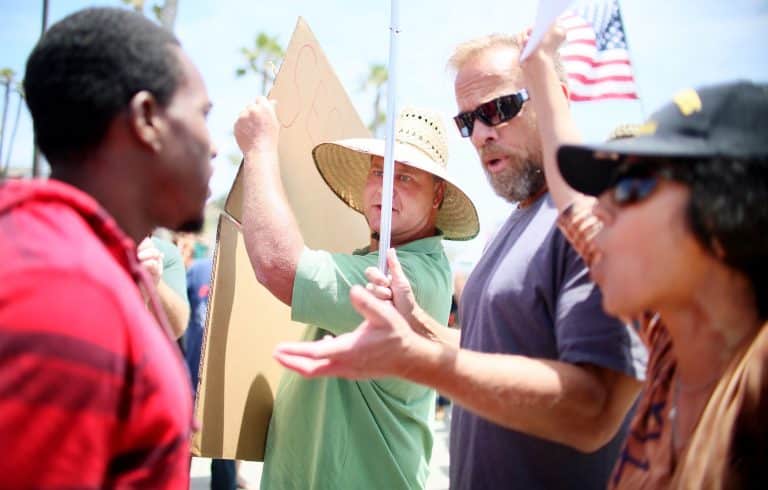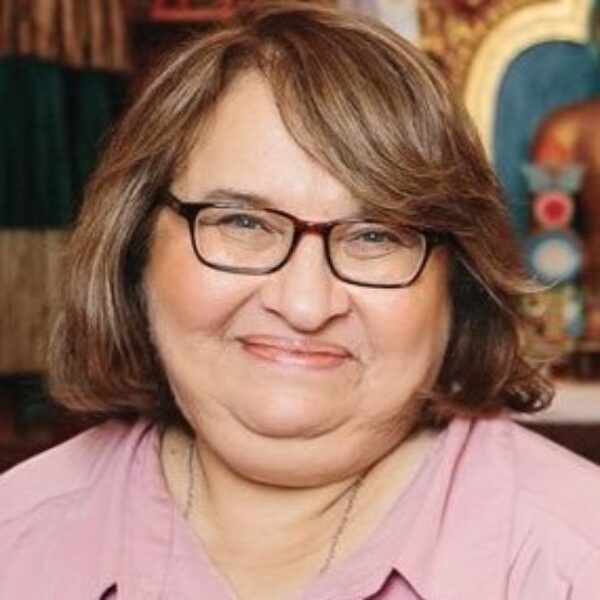
Image by Sandy Huffaker/Getty Images, © All Rights Reserved.
Talking to Our Enemies
I was sitting in the living room of my friend’s house scanning the titles of his books, listening as he described his well-considered intentions to talk to those he disagreed with politically. We are cordoned off in our silos, he said, and we rarely meet the people who have opposing views. This is the problem with our country now, he asserted — we no longer talk to one another and we don’t even try to find common ground.
He then asked me if I shared his goal. I said, “I don’t want to harm people and I believe that hating anyone inevitably takes too much energy. I want to have conversations with those with radically different views from those I hold, but the truth is I also want to keep them from having power over my life.” Just then my eye fell on Vietnamese Zen teacher Thich Nhat Hanh’s book entitled The Art of Power.
Saying I want that power is not an expected Buddhist response, but it is the truthful response from me even at a time when people are questioning modes of dominance in power, and urgently working toward a shift. Riane Eisler is one, through the work of the Center for Partnership Studies. They describe their work as “moving from domination to partnership, from control to care, from power-over to empowerment.”
I am inspired by that vision and want to help work towards it. At the same time, as long as in reality there is a dominance model at work, one that is deciding policy and affecting peoples’ lives every day, I’m also moved to work to try to make sure those who seek to harm me or others don’t have the power to dominate.
My mantra for a long time has been “Vote, vote, vote.” I believe that we each have to participate in the system as it is: It’s what we’ve got, and through our elected representatives vital issues of peoples’ lives — like health care and civil rights — are decided every single day. This isn’t an academic exercise or an abstract consideration — hope is being whittled away for real people struggling just to live. I have never heard the word “despair” used so much as I have this year.
I remember riding to New York City in a car from Massachusetts, watching on my phone as the Climate March made its way through the streets of Manhattan. I saw all these jubilant faces on Facebook and Twitter happy to participate in this show of solidarity, yet I kept thinking, “Do all of you vote?” As long as we refuse to exercise this power we will become subject to the actions of those who seek to keep it from us.
This is why I don’t think of sincere conversations as a singular remedy. In the same vein, I don’t think a new vision of power is remedy enough. Both are important, even essential. But in the heart of how things actually work right now I’d rather not have my life choices determined by folks who march on the weekends while waving Nazi flags.
The Buddha said that lovingkindness is the antidote to fear, and this is something I repeated often in this year as people coming to talk to me described themselves as struggling with anger and fear. I want to do what I can to soothe people and at the same time inspire them to action, so that our actions can come more from a place of wisdom than hate. I’m very aware though, that no sooner would I advise that we should meet the powerful chaos and fear with powerful love than a trans person or a person of color or, more commonly these days, a Jewish person, would write me to disagree. As one wrote, “Why should I listen politely to someone who hates me, who does not believe I should exist?”
That response made me examine my approach, as did the demonstration in Charlottesville this summer. The men who marched in Charlottesville chanting “Jews will not replace us” and “blood and soil” touched a fear deep in the marrow that connects me to my ancestors, the inter-generational transmission of trauma. Those descended from survivors of genocide can feel that trauma even if they cannot remember its origin. The children of those who survived the recent murders in Sutherland, Texas could be affected by this, and their children as well.
How does fear move across generations to reside in the bodies of those who never experienced the original trauma? In Lost in Transmission: Studies of Trauma Across Generations, one essay described the point of view of a sidewalk Santa who was ringing his bell on the streets of New York the Christmas after 9/11. He said he observed how parents changed the way they shepherded their children through the crowds, holding them tightly to their sides and more closely when the parents faced a person who frightened them. As those children maneuvered through the world clutched by mom and dad, they absorb their trauma. This how trauma ripples through the generations.
I felt that within me watching the demonstrations in Charlottesville, and I expect that those who faced down that racing car in the street may transmit the terror they faced to their children and beyond. This is why talking to one another best takes place at the very least on the common ground that we each have the right to exist. Because that’s not always there, we work to keep power from those preaching hatred and division, and if we have power ourselves we choose to exercise it differently.
In a recent episode of Reveal, host Al Letson tested the common ground. He was covering the antifa/Nazi conflict outside the U.C. Berkeley campus. Letson, a fit and muscular African-American man, walked with his crew right into the center of crowd where he saw a mob attacking a man, kicking and beating him. Letson leapt in to save the man on the ground. Only later did he find out that the man he rescued was one of the Nazis. He had saved the life of someone who did not believe Letson should exist.
Letson invited the man he rescued to the studio. Their conversation is well worth hearing, as it set both of them off their moorings. They confront each other and dispute facts, but the fact that Letson’s action granted them both the right to exist means that action created common ground. His conversation with a man who would be his enemy captures a rare moment when this new trauma they experienced together muffles the ones from generations ago that set up this conflict.
The way that people talk about common ground, it sounds almost magical, as if one could define a space and all would come there with open hearts and minds to build on what they share. In these conflicted times our wounds and vulnerabilities, some of which occurred generations back, make it difficult for dialogue to begin or to succeed in creating a feeling of safety. That beautiful impulse my friend has to try to talk to his enemies may spring from his deeply-held convictions and a sense of his personal power. Yet for those who do not share his confidence, any encounter with political opponents may place them too much at risk to chance it.
The actions we take when we are really disconnected come from a place of suffering. We can and should develop greater compassion for those we consider disconnected from themselves and the world, those who propagate hatred or bias. In addition to working on compassion for the frightened, fearful and disconnected, along with building bridges and reducing your own hatred, vote! Aside from anything else we do, we also should do everything we can to not foster the power to create harm.

Share your reflection